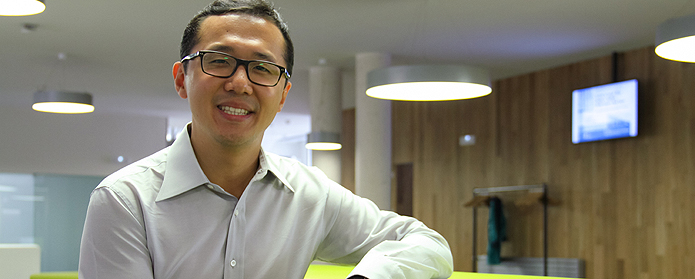"In Africa the notion of time is different: when you visit a sick person at home you can stay for more than an hour, make them feel important."
John Rhee, a student of postgraduate program at School Mount Sinai Medicine (USA), gave a talk about his stay in Uganda, the most developed palliative care country in Africa.

"In Africa the notion of time is different: when you visit a sick person at home you can stay more than an hour with him. It is a way of caring for the patient that makes him feel important". This is what John Rhee, a student of postgraduate program of Medicine at the School of Mount Sinai Medicine (New York, USA), said at the University of Navarra.
Rhee gave a talk at discussion paper 'AFRICA: A medical student at Hospice Africa Uganda'. The activity was part of the series of colloquiums 'Palliative Care in three continents', organized by the ATLANTES Program of the Institute for Culture and SocietyThe event was organized by the ATLANTES Program, the School of Medicine of the University of Navarra and the Navarra Society of Palliative Care. It was held at the high school Oficial de Médicos de Navarra with the goal to raise awareness of palliative care programs around the world. The activity is supported by partnership of the Obra Social 'La Caixa' and Fundación Bancaria Caja Navarra.
On his discussion paper, John Rhee focused on his stay at Hospice Africa Uganda (HAU), one of the most prestigious care centers on the continent. Among other activities, he carried out home consultations, as patients are not usually admitted to hospital in Africa.
"It was not only a matter of administering medication, but also of taking care of the social and psychological dimension of the patients. They have difficulties, as can be seen at home," explains the student. "Sometimes, they are things as simple as the distance they have to walk to go to the toilet or even that there is no bathroom in the house," he adds.
In Uganda, he said, there are few resources and palliative care is not subsidized by the government. "Many people cannot receive palliative care because they cannot afford to pay for treatment," he said. Despite the fact that they have financial aid of NGOs, which fund free consultations and medicines and that there are numerous national and international volunteers, in Rhee's opinion "it is not a sustainable funding model ". "HAU has lost some of its international funding in the last year and, as a result, has had to stop some projects," he lamented.
Leader in AfricaUganda is one of the African countries with the most developed palliative care due to several factors, Rhee stresses: the Ministry of Health supports palliative care, the law allows nurses to administer opioids - since there are not many doctors -, access to services is easy, and there are programs at training - for example, HAU offers a diploma in palliative care.
In addition, the HAU has carried out a plan of Education on the use of morphine to explain to families and professionals its administration and its effects. The goal has been to combat the widespread fear of the use of this drug. "I found some patients who took less than they needed and were still in pain, and others who were reluctant to take it," Rhee said.